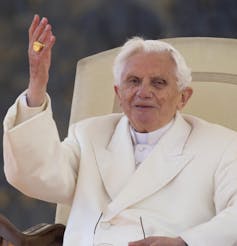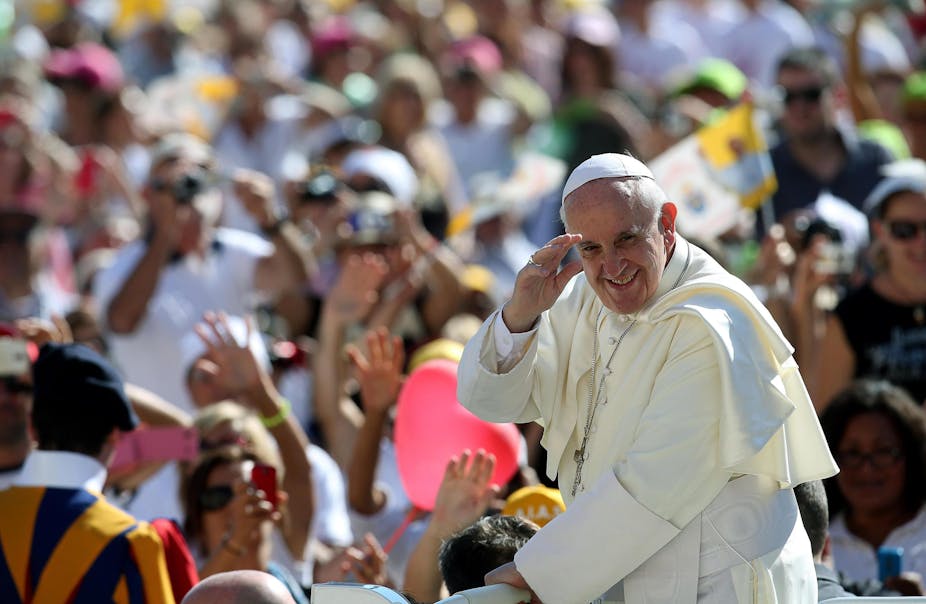Pope Francis has made headlines recently with comments about abortion, gay marriage, contraception, work and capitalism. Francis has said that he’s “not spoken much about these things [abortion, gay marriage, contraception]”, while also stating that human life is being degraded by a “throwaway culture”.
Francis has also criticised the global economic system for its idolisation of money and inability to provide dignified work for people. How can we make sense of these comments?
There is an underlying consistency to Francis’ remarks, though this consistency can get lost when only sections of Francis’ comments are reported.
In the first place, Francis is reflecting Catholic Church teaching on life and social issues - for example, that human life is sacred and has an inherent dignity. This dignity is the basis for human rights for all, including a right to life and to dignified work. Without this basis in the absolute dignity of the human person, rights lose their foundation and meaning. Speaking to a group of Catholic gynaecologists, Francis argued:
The paradoxical situation is seen in the fact that, while new rights are attributed to the person, sometimes even presumed, life is not always protected as primary value and primordial right of every man [human].
Francis is critical of the cultures and economic system that disrespect human dignity and rights. Speaking in Sardinia, where the divide between rich and poor is stark, he was critical of systems and organisations that make money the sole focus of economic and social decisions.
Profits are legitimate, but excessive profiteering with little or no respect for the dignity of people to work in meaningful occupations and just conditions is highly problematic. Francis knows the results of this excessive profiteering in the experience of his own family who had to migrate from Italy to find work, and in the experience of South America.
Francis is highlighting how this excessive focus on profits and money - rather than people - is corrosive of the global economic system. Given the effects of the global financial crisis, are the lessons of greed and profiteering being learned, or are they becoming more ingrained in global economics? Francis is continuing and intensifying the critique of his predecessor Pope Benedict XVI in this regard, particularly in Benedict’s encyclical Caritas in Veritate, which addressed the GFC.
In making these statements, however, Francis’ primary focus is pastoral and missionary. What this means is that Francis is concerned with the church putting its words into action. That is, putting the person at the heart of its actions:
In life, God accompanies persons, and we must accompany them, starting from their situation. It is necessary to accompany them with mercy.
This is why Francis contends that he has not spoken much about certain moral issues, such as abortion and gay marriage. He has done so on occasions that are appropriate, but in general he prefers to focus on the church’s mission to preach and live the Gospel of God’s love.

Francis’ approach is reminiscent of comments made by Benedict XVI:
If we let ourselves be drawn into these discussions, the Church is then identified with certain commandments or prohibitions; we give the impression that we are moralists with a few somewhat antiquated convictions, and not even a hint of the true greatness of the faith appears. I therefore consider it essential always to highlight the greatness of our faith.
For this reason, Francis states that rules and structures are not the church’s priority, but what:
…the church needs most today is the ability to heal wounds and to warm the hearts of the faithful; it needs nearness, proximity. I see the church as a field hospital after battle.“
This approach seems to be one that Francis already had developed in Argentina. He is reported to have participated in reflections over different forms of liberation theology in Argentina, but was more focused on the "pastoral application”, particularly in the church’s ministry to the poor.
Therefore, while Francis affirms church teaching, his main aim is to orientate the church in its mission. Without a basis in God’s love, Francis suggests that “the moral edifice of the church is likely to fall like a house of cards”. Francis is critiquing a rigidly moralistic or bureaucratic approach to people that no longer has God’s love at its heart. For Francis, the Catholic Church needs to be more missionary in its outreach to people in love, rather than being focused on ideology, careerism, buildings and bureaucracy.
Thus, Francis is seeking a reformation, not of the church’s teaching, but of its attitude. Like Francis, Benedict XVI emphasised a conversion of the heart as central to changing the church and the world. Francis is defining this further by concretely stating that the church must be more focused on enabling the encounter with a merciful God.
This does not mean that commandments and rules are unimportant, but that they must be contextualised in love. Spiritual and moral progress takes time, with a mature church to accompany and facilitate the process. As Francis has stated, judging people - especially people of goodwill - is not helpful for people’s progress.
Pope Francis is desperate to save the church from an inward focus and judgmentalism, by orientating it outwards to its essential mission: to offer people the space to encounter God’s love, particularly in relationship with the poor.

